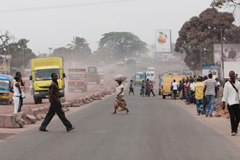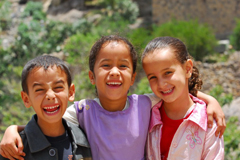Researchers Present Findings at JASID Conference
2016.12.21
The 27th Annual Conference of the Japan Society for International Development (JASID) was held on November 26 and 27, 2016, at Hiroshima University, Japan. JICA Research Institute (JICA-RI) Senior Research Fellow Hiroaki Shiga gave a presentation entitled “Normative Framing of Development Cooperation: Japanese Bilateral Aid between the DAC and Southern Donors,” and Research Assistant Kengo Igei gave a presentation entitled “Determinants and Effects of Parental Aspirations and Attitudes Towards Girls’ Education: Evidence from Rural Yemen.” In addition, many other JICA-RI researchers and affiliated personnel gave presentations, acted as chairpersons, or served as commentators.

A Chinese-built road in the Democratic Republic of the Congo (Photo: JICA/Shinichi Kuno)
In his presentation, Shiga explained that the normative framing of development cooperation had in the past been formed with western developed nations, the members of the OECD Development Assistance Committee (DAC) in particular, taking the lead. However, with the rise of China, India, and other providers of the South-South Cooperation, normative framing of South-South Cooperation is garnering attention. He discussed that Japan is a member of the DAC but it has a distinctive philosophy and practices that appear to share characteristics with the approach of Southern donors.
Shiga also pointed out that, in contrast to the other DAC donors’ notion of “aid as charity,” Japan views aid as “cooperation” in which equals work for mutual benefits. Japan promotes a “trinity” approach, in which it coordinates its ODA, private investment, and trade in an effective manner with the private sector. That approach shares many characteristics with the normative framework of South-South Cooperation, which emphasizes the principles of non-intervention in the domestic affairs of the recipient countries and aid for mutual benefit. Shiga explained that the starting point for Japan’s “economic cooperation (keizai kyoryoku)” was the economic cooperation agreements following the end of World War II at the same time as the postwar reparations agreements, which were aimed at reconciliation with the countries of East and Southeast Asia, and reestablishment of access to their markets and resources.
Shiga also pointed out the changes in Japan’s norms for aid since the 1970s. The changes were due to an expansion of aid to the Middle East, Africa, and South America, as well as the redefinition of economic cooperation as having the mission of contributing to Japan’s security, in the broad sense, by creating stable, cordial international relationships. Finally, Shiga said that “Japan advocates becoming a development partner to developing countries, with equality and mutual benefit, while sharing a Western style of aid norms as a DAC member country. This is one of Japan’s strengths, but this places Japan in a tricky position that could result in mutual distrust.” The session was chaired by former JICA-RI Director Hiroshi Kato.

Urban streetscape of India
(Photo: JICA/Mika Tanimoto)
Research Assistant Kengo Igei gave a presentation related to girls' education in Yemen. He reported the following results of empirical analysis based on the primary data of residents of rural areas in Yemen. Firstly, there is variation in parental perceptions of girls’ education, and mothers do not necessarily have a higher awareness of girls’ education than fathers do. Parental perceptions of girls’ education are correlated to the level of education and literacy of the parents, and a patriarchal view of families and society’s view of girl’s education also had significant impact. In addition, such parental perceptions are significantly associated with school enrollment of girls aged 6 to 14. He explained that the findings indicate the presence of intergenerational virtuous cycles between girls’ schooling and parental perceptions of girls’ education, and support awareness-raising programs, especially in rural areas where traditional social norms are still influential.
JICA-RI Research Fellow Yukimi Shimoda gave a presentation entitled “We Bring Our Contribution to the Family Budget: Some Influences on People through Inclusive Business Activities” in the General Oral Presentation: Social Aspects of Economic Development session, and JICA-RI Visiting Scholar Go Shimada (Associate Professor, University of Shizuoka) gave a presentation entitled “Impacts of the Kaizen on Workers: Evidence from Central America and Caribbean Region” in the Social Impact of Aid and Policy session.
Former JICA-RI Director and current Visiting Fellow Ichiro Tambo (Professor, Kibi International University) proposed the “Thematic Session: Long-term Monitoring of Reconstruction Assistance to Conflict Affected States,” served as chair of the session, and gave a presentation. Tambo also served as a commentator in the “Thematic Session: Issues and Achievement of Higher Professional Human Resource Development Utilizing JOCV Program in Japanese Graduate School” session.
JICA-RI Visiting Fellow Jin Sato served as chair of the “General Oral Presentation: Social Development” session and JICA-RI Deputy Director Nobuko Kayashima served as chair of the “General Oral Presentation: Curriculum 1” session, which was related to education. Former JICA-RI Director Hiroshi Kato served as a commentator in the “Plenary Session: Development Cooperation for Future - Diversity and Collaboration” session, and Senior Research Fellow Hiroaki Shiga did the same in the “General Oral Presentation: Governance” session.

Yemeni children
(Photo: JICA/Jiro Nakahara)

事業事前評価表(地球規模課題対応国際科学技術協力(SATREPS)).国際協力機構 地球環境部 . 防災第一チーム. 1.案件名.国 名: フィリピン共和国.

事業事前評価表(地球規模課題対応国際科学技術協力(SATREPS)).国際協力機構 地球環境部 . 防災第一チーム. 1.案件名.国 名: フィリピン共和国.

事業事前評価表(地球規模課題対応国際科学技術協力(SATREPS)).国際協力機構 地球環境部 . 防災第一チーム. 1.案件名.国 名: フィリピン共和国.

事業事前評価表(地球規模課題対応国際科学技術協力(SATREPS)).国際協力機構 地球環境部 . 防災第一チーム. 1.案件名.国 名: フィリピン共和国.

事業事前評価表(地球規模課題対応国際科学技術協力(SATREPS)).国際協力機構 地球環境部 . 防災第一チーム. 1.案件名.国 名: フィリピン共和国.
scroll